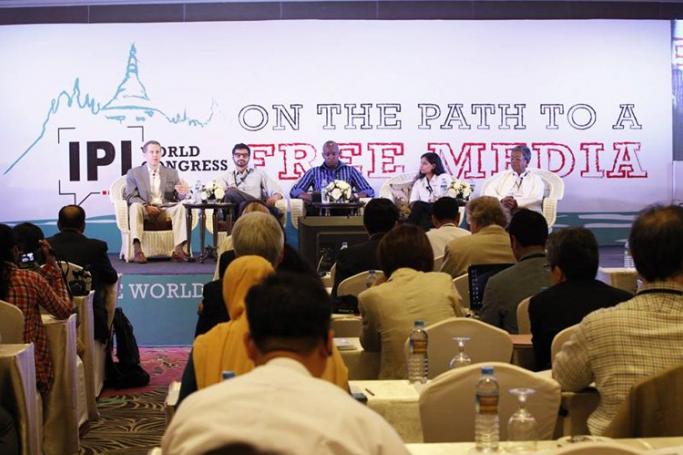As a small group of protesters stood outside, participants at the International Press Institute world congress discussed the challenges to press freedom in Myanmar and throughout the world.
About 250 delegates from dozens of countries attended the first IPI event to be held in Myanmar, on the theme “On the path to a free media”, at the Chatrium Hotel in Yangon from March 27 to 29.
The topics discussed by delegates ranged from the legal framework needed in Myanmar to promote freedom of speech to financing journalism in future and how sensitive topics involving religion should be covered in breaking news.
Many sessions referred to the change from print to online media and the challenges and opportunities it presents for media groups and journalists.
The event was subject to a boycott called by some Myanmar journalists in support of the release of three reporters arrested during the crackdown on protesters at Letpadan on March 10.
During one of the panel discussions, journalist Soe Yarzar Tun, wearing a mask, stood silently in the auditorium holding aloft a sign saying “Stop beating, arresting, imprisoning journalists”. The panel’s members included Information Minister U Ye Htut, who said the protest was a sign of how much Myanmar was changing.
In a discussion on protecting’s journalists’ safety, Charlie Sennott, the vice-president, editor-at-large and co-founder of the Global Post and founder of the GroundTruth Project, said extremist groups such as Islamic State have no need of journalists to report on their activities because they rely on the internet. Mr Sennott said journalists in the past were protected by the fact that they carried messages that all sides to a conflict wanted to be publicised.
A panelist at the same session, Al Jazeera journalist Jane Arraf, who covered the war in Iraq when she was with CNN, said it was not possible to eliminate risk but that risk evaluation was essential. Journalists working in dangerous situations need careful preparation and local knowledge to help protect themselves, she said.
“We need to sell news in a profitable and valuable manner,” said Zambia Post editor Fred M’membe in a discussion on the challenges to print media from the internet and social media. The session heard most media groups make little money from the rise of the mobile media that has accompanied the decline in the print media.
7Day Daily editor-in-chief U Thaung Su Nyein spoke of a situation in which newspapers post content on social media such as Facebook, that earn revenue from advertising.
“Facebook engagement in Myanmar is extremely high, but we don’t have control on advertising there,” U Thaung Su Nyein said.
Nobel peace prize laureate and micro-finance champion Mohammed Yunus said financial systems must be inclusive.
Micro-finance solved the problem caused by banks that only wanted to lend to those with a certain level of income and excluded the poor.
“Poverty does not belong to human beings, we are all by nature entrepreneurs,” said Dr Yunus.
Moderate voices don’t sell, said Swami Agnivesh, a campaigner against bonded labour and founder coordinator of the Parliament of All Faiths, during a session on covering breaking news events involving religious sensitivity. Often the loudest and most controversial voices are heard that do not represent the majority and an example was the extremist groups in Islam.
You are viewing the old site.
Please update your bookmark to https://eng.mizzima.com.
Mizzima Weekly Magazine Issue...
14 December 2023
Spring Revolution Daily News f...
13 December 2023
New UK Burma sanctions welcome...
13 December 2023
Spring Revolution Daily News f...
12 December 2023
Spring Revolution Daily News f...
11 December 2023
Spring Revolution Daily News f...
08 December 2023
Spring Revolution Daily News f...
07 December 2023
Diaspora journalists increasin...
07 December 2023
World Bank rep optimistic about Myanmar’s economy












